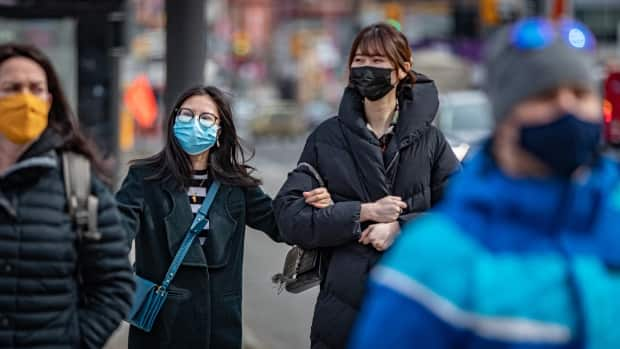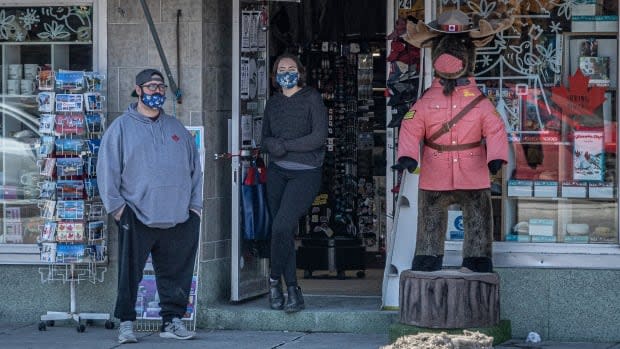What you need to know about COVID-19 in Ottawa on Friday, March 19

Recent developments:
Ottawa is reporting 74 new cases of COVID-19 on Friday and one death.
What's the latest?
Ottawa Public Health (OPH) recorded 74 new cases of COVID-19 on Friday and one death. The capital's largest shelter outbreak is over and OPH has passed its target of vaccinating 75 per cent of retirement home residents.
Ottawa moves into the red zone on Ontario's pandemic scale today, limiting the size of gatherings and the number of people allowed inside restaurants and gyms.
Several hospitals in the Ottawa area are at or over full capacity, but not because of COVID-19 patients — many people who don't have the illness are delaying going to hospital.
Ontario residents born in or before 1946 can make COVID-19 vaccine appointments starting Monday. Also starting Monday, anyone in the Kingston area above age 60 can contact participating pharmacies for a vaccine.
How many cases are there?
As of Friday, 15,914 Ottawa residents have tested positive for COVID-19 since the start of the pandemic. There are currently 668 known active cases, 14,795 resolved cases and 451 deaths.
Public health officials have reported more than 28,300 COVID-19 cases across eastern Ontario and western Quebec, including more than 26,300 resolved cases.
Elsewhere in eastern Ontario, 134 people have died of COVID-19 and 168 people have died in western Quebec.
Akwesasne has had more than 250 residents test positive on the Canadian side of the border, eight of them active cases, and seven deaths. It's had more than 500 cases combined with its southern section.
Kitigan Zibi has had 22 confirmed cases and Tyendinaga Mohawk Territory has had eight, with one death.
CBC Ottawa is profiling those who've died of COVID-19. If you'd like to share your loved one's story, please get in touch.
What can I do?
The province's science advisors are among the experts saying Ontario is in its 3rd wave of the pandemic.
Eastern Ontario now ranges from red to green under the province's colour-coded pandemic scale.
Restaurants, gyms, personal care services and non-essential businesses are open across the region.
Outside red zones, social gatherings can have up to 10 people indoors or 25 people outdoors. Organized events can be larger.
WATCH | Ontario's 3rd wave of COVID-19 could hit younger adults harder:
With Ottawa in the red zone, all gatherings are capped at five people inside and 25 outside.
Indoor dining is limited to 10 people at a time. Theatres are closed and team sports games or scrimmages are not allowed.
Going red means only leaving home for essential reasons and not having inside visitors.
Ottawa Public Health said Thursday its spread of COVID-19 is getting out of control.
Local health units can also set their own rules, like what Kingston's is doing around gatherings and Lanark County's is doing for sports.
Western Quebec's gyms and restaurants can open under its orange zone rules, as can non-essential businesses.
Outdoor gatherings of up to eight people are allowed. The region's curfew hours are 9:30 p.m. until 5 a.m.
Grenville-sur-la-Rouge and some of the surrounding area remains in red.
Next week local high schoolers can return to in-class learning full time and sports rules will be relaxed.
People in all these areas are asked to only have close contact with people they live with, be masked and distanced for all other in-person contact and only travel for essential reasons, especially between differently coloured zones.
Distancing and isolating
The novel coronavirus primarily spreads through droplets when an infected person speaks, coughs, sneezes, or breathes onto someone or something. These droplets can hang in the air.
People can be contagious without symptoms, even after getting a vaccine. New coronavirus variants can be more contagious and are spreading quickly in some places.
This means it is important to take precautions now and in the future like staying home while sick — and getting help with costs if needed — keeping hands and surfaces clean and maintaining distance from anyone you don't live with, even with a mask on.
Masks, preferably ones that fit snugly and have three layers, are mandatory in indoor public settings in Ontario and Quebec.
OPH says residents should wear masks outside their homes whenever possible.

Health Canada recommends older adults and people with underlying medical conditions and/or weakened immune systems stay home as much as possible and get help with errands.
Anyone with COVID-19 symptoms should self-isolate, as should those who've been ordered to do so by their public health unit. The length varies in Quebec and Ontario.
People have to show proof of a recent negative COVID-19 test to enter Canada by land without a fine and have to pay for their stay in a quarantine hotel if entering by air.
Vaccines
Four COVID-19 vaccines have been approved in Canada.
Canada's task force said first doses offer such strong protection that people can wait up to four months to get a second, meaning jurisdictions can spread first doses widely.
About 195,000 doses have been given out in the wider region since mid-December, including more than 88,000 doses in Ottawa and about 24,000 in western Quebec.
Ontario's first doses generally went to care home residents and health-care workers.
The provincewide campaign has expanded further into Phase 1 to include more priority groups such as all people over age 80. On Monday, it's anyone above 75. People can book appointments online or over the phone.
Local health units have some flexibility in the larger framework, so check their websites — as they're asking people to keep their phone lines clear — for details.
People who are above age 60 to 64 or will be turning 60 or 65 this year in the Kingston area can contact one of nearly 50 pharmacies for a vaccine appointment as part of a pilot project. It's anyone above 60 as of Monday.
Phase 2 should include people with underlying health conditions in April, then people who can't work from home and down in age to 60 in June. Phase 3 in July will have vaccines for everybody over age 16.
Quebec also started by vaccinating people in care homes and health-care workers.
The vaccination plan has moved to people age 65 and older at six western Quebec clinics, then essential workers and finally the general public.
Officials expect everyone over the age of 65 to be vaccinated by mid-April and everyone who wants a shot to be able to get one by by Fête nationale June 24.
People who qualify can make an appointment online or over the phone. Pharmacists there will also be giving shots.
Symptoms and testing
COVID-19 can range from a cold-like illness to a severe lung infection, with common symptoms including fever, a cough, vomiting and loss of taste or smell. Children tend to have an upset stomach and/or a rash.
If you have severe symptoms, call 911.
Mental health can also be affected by the pandemic, and resources are available to help.
In eastern Ontario:
Anyone seeking a test should book an appointment.
Ontario recommends only getting tested if you have symptoms, if you've been told to by your health unit or the province, or if you fit certain other criteria.
People without symptoms but who are part of the province's targeted testing strategy can make an appointment at select pharmacies. Travellers who need a test have very few local options to pay for one.
Check with your area's health unit for clinic locations and hours. Some are offering pop-up or mobile clinics.
In western Quebec:
Tests are strongly recommended for people with symptoms and their contacts.
Outaouais residents can make an appointment in Gatineau at 135 blvd. Saint-Raymond or 617 ave. Buckingham. They can check the wait time for the Saint-Raymond site.
There are recurring clinics by appointment in communities such as Maniwaki and Petite-Nation.
Call 1-877-644-4545 with questions, including if walk-in testing is available nearby.
First Nations, Inuit and Métis:
Akwesasne has a COVID-19 test site by appointment only and a curfew of 11 p.m. to 5 a.m.
Anyone returning to the community on the Canadian side of the international border who's been farther than 160 kilometres away — or visited Montreal — for non-essential reasons is asked to self-isolate for 14 days.
People in Pikwakanagan can book a COVID-19 test by calling 613-625-1175. Anyone in Tyendinaga who's interested in a test can call 613-967-3603 and in Kitigan Zibi, 819-449-5593.
Inuit in Ottawa can call the Akausivik Inuit Family Health Team at 613-740-0999 for service, including testing and vaccines, in Inuktitut or English on weekdays.
For more information

